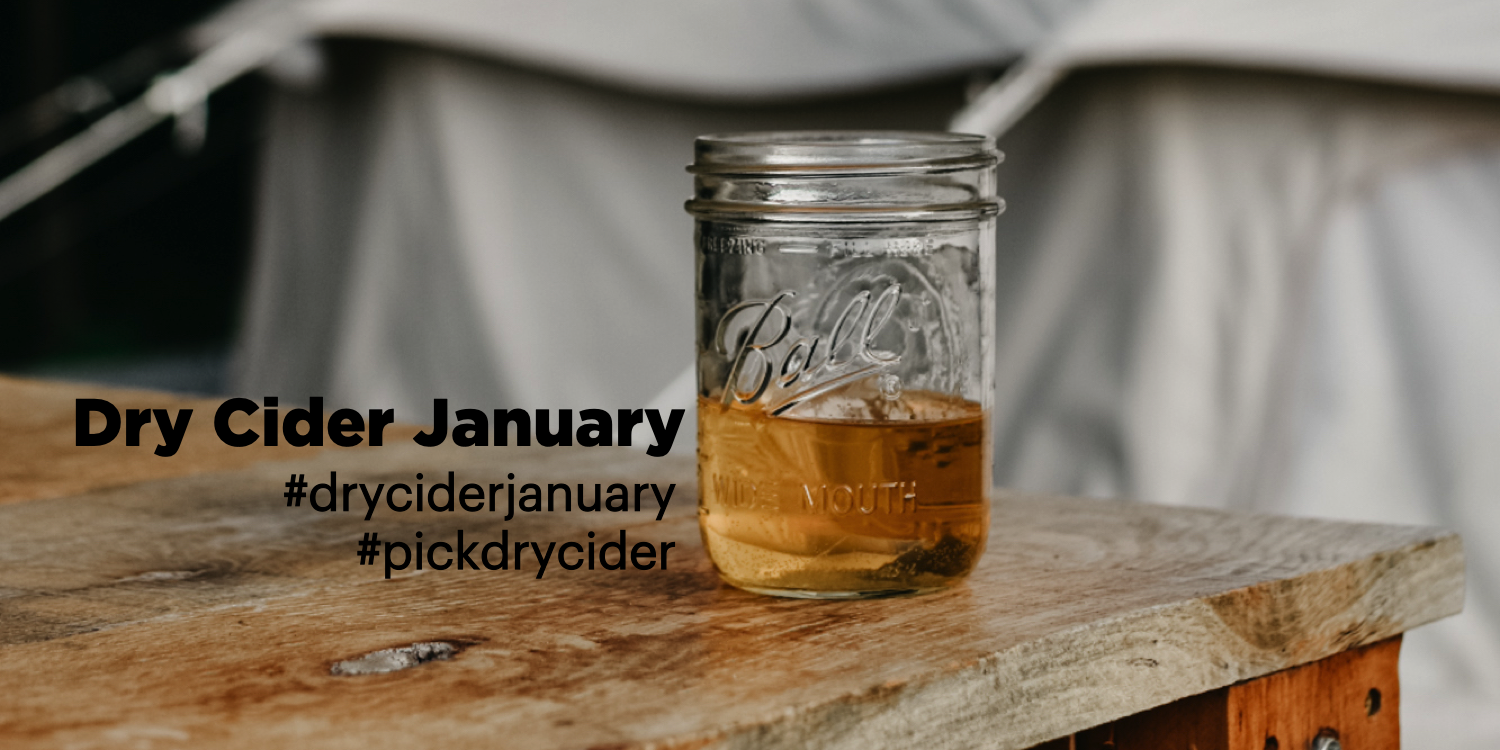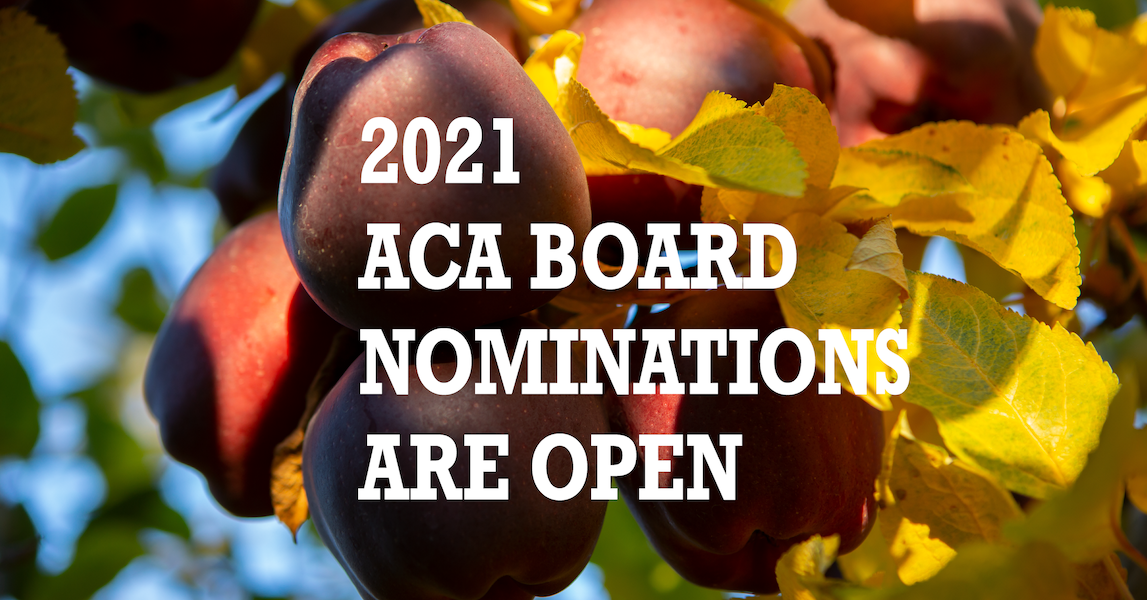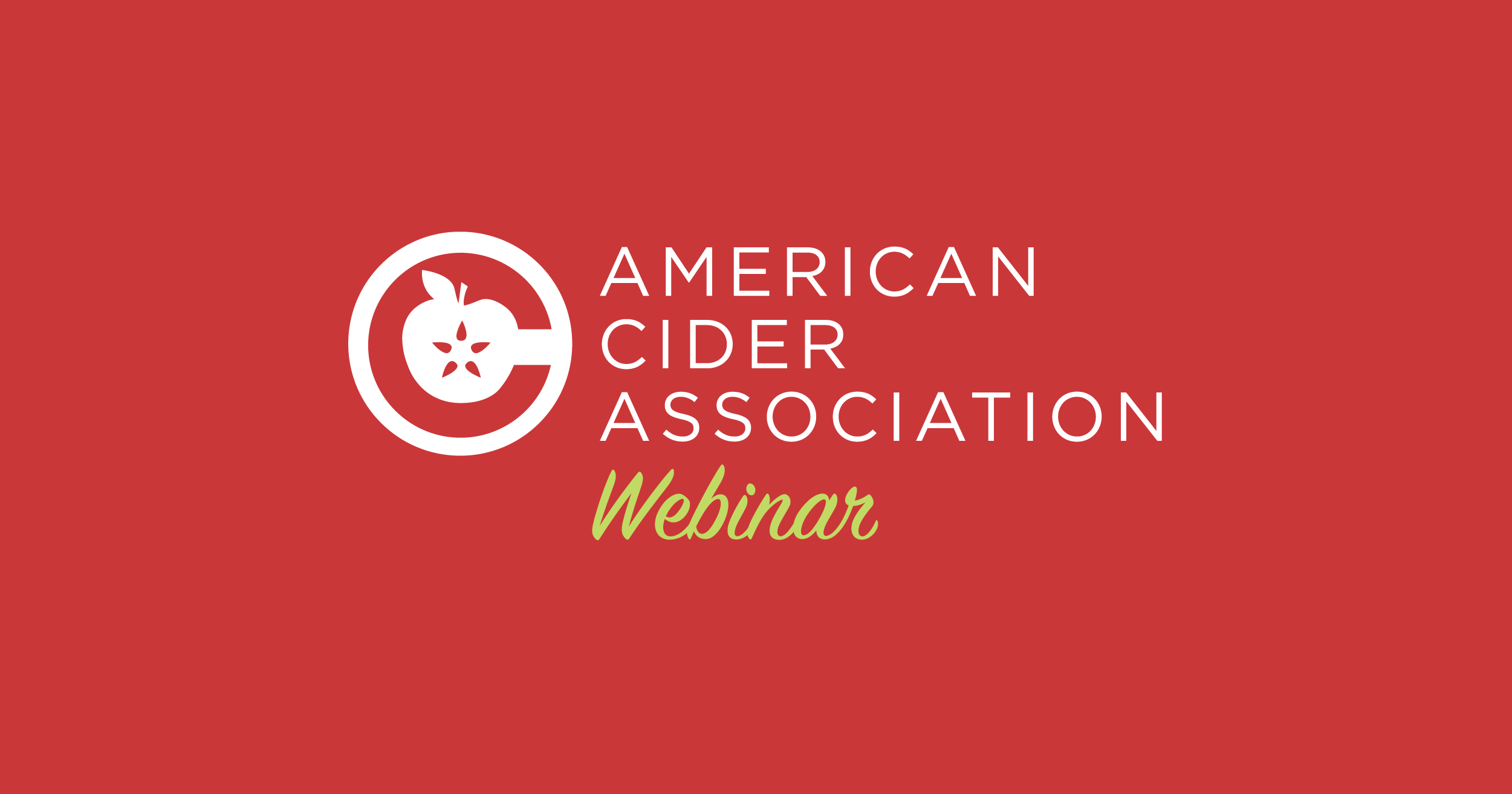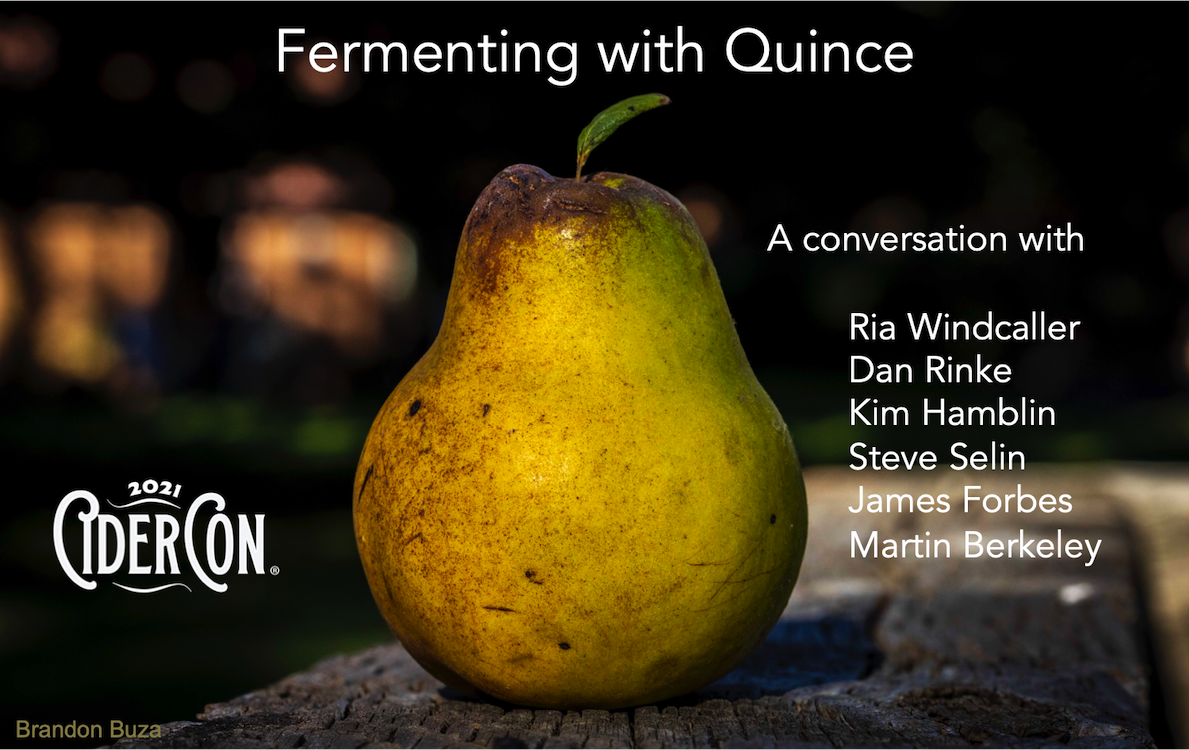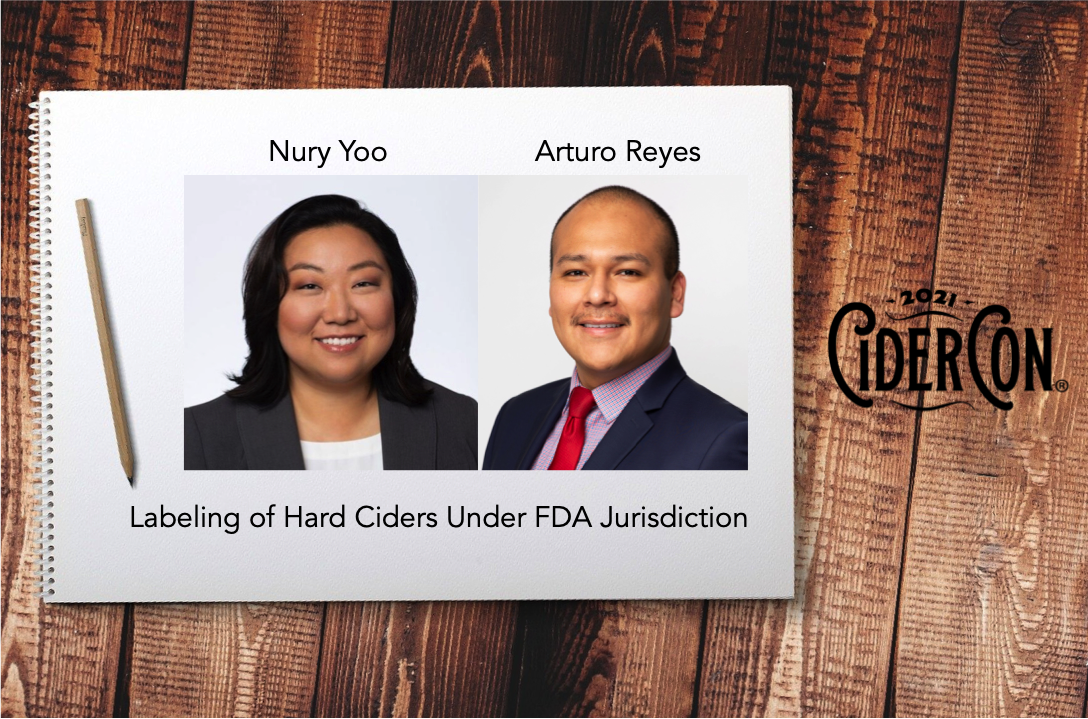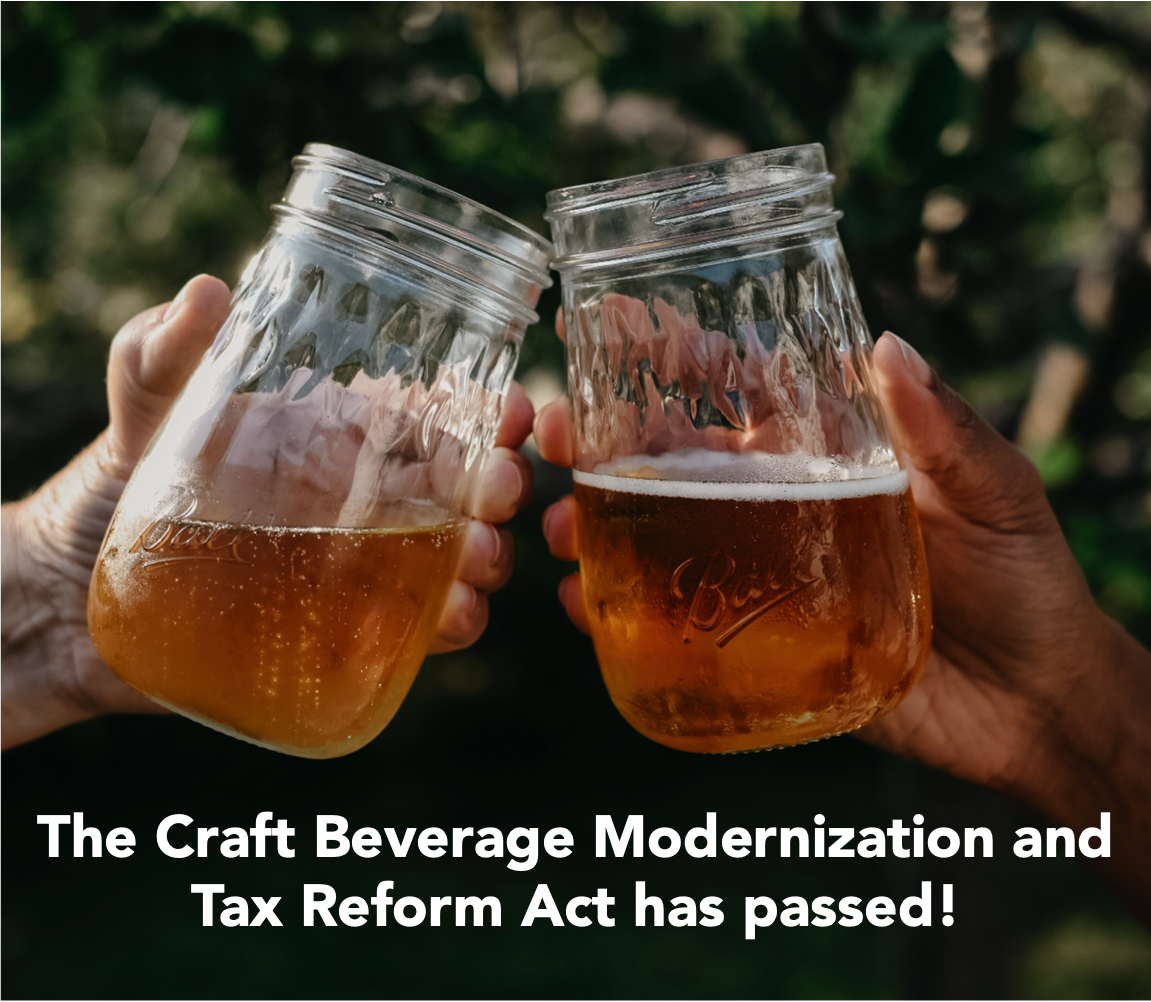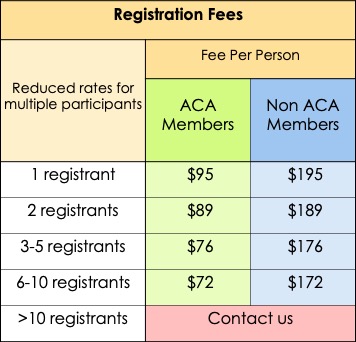Archive for December 2020
ACA Launches 2nd Annual Dry Cider January
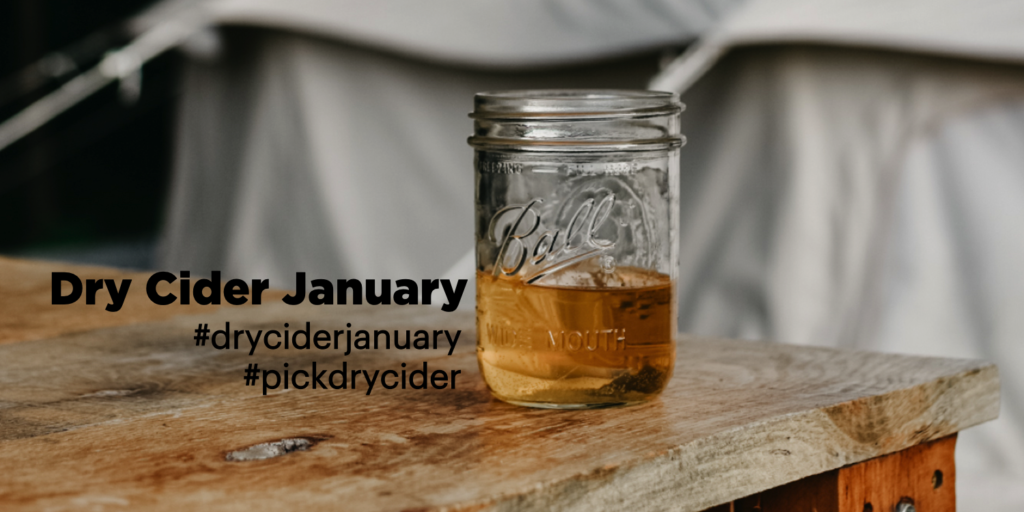
The American Cider Association (ACA) is once again launching their month long campaign called Dry Cider January to celebrate ciders containing 0 grams of residual sugar. The ACA hosts a dry cidery directory on their website to promote their members’ ciders. The association is encouraging others to join the campaign through social media with the hashtags #dryciderjanuary and #pickdrycider.
The ACA’s Dry Cider Directory will be updated as members submit new product releases. The directory can be found here on ACA’s website. The list can be filtered and sorted so consumers can find no-sugar ciders local to them.
Alcohol is created when yeast converts sugar into alcohol through fermentation. A cider that contains no residual sugar has been fermented to absolute dryness. Sometimes cidermakers will blend a completely dry cider with fresh juice for acid/sugar balance, but other times they leave the cider entirely dry. These dry ciders are what the association is listing on their website for the campaign.
“The brain has a hard time distinguishing fruity from sweet. Many ciders with absolutely no sugar in them can still be fruit-forward,” explained the association’s executive director, Michelle McGrath. “You’ll find there are a multitude of dry ciders available when you start seeking them,” she added.
The list of ciders on the association’s website demonstrates the flavors and styles possible not only in the cider category, but in ciders with 0g sugar. From single varietal ciders showcasing specific apple varieties and served in a 750ml bottle to ciders aged on rose and hibiscus petals and served in a 12 oz can, the range is impressive.
Follow the association on their Instagram account @pickcider to learn more about the campaign.
Are you a cidermaker and want to add a cider to the directory? Fill out the form HERE! Have a picture and description of your cider ready to go before you fill out the form.
ACA Board of Directors Election Announcement
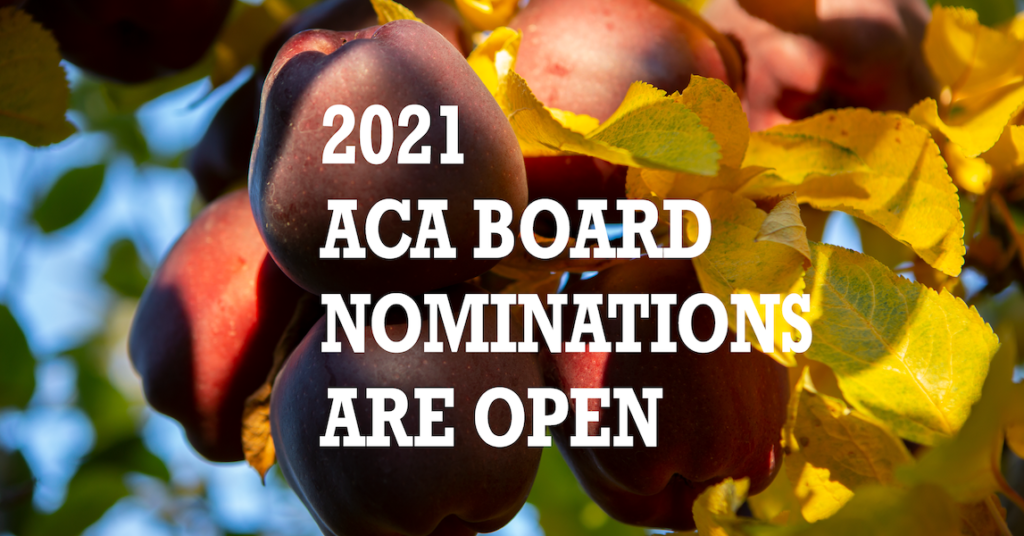
The American Cider Association is accepting nominations for joining their board of directors. Nominations are due January 22. These are volunteer positions with a three year commitment. Active membership of the association is one of the few requirements. There are three seats in this year’s election. Incumbents whose terms are up for renewal may choose to run for these seats again. The three seats up for renewal are:
- At Large 1 (Open to any permanent salaried employee of US-based ACA member cidery in any region – no size restrictions)
- At Large 2 (Open to any permanent salaried employee of US-based ACA member cidery in any region – no size restrictions)
- Large Cidery (Open to any salaried permanent employee of US-based ACA member cidery in any region where 2020 production was more than 1 million gallons of cider)
Interested candidates should complete the self-nomination form here:
Have questions about board service? Reach out to Michelle. She can send you an informational video that she recorded last year and schedule a time to chat.
Do you know who is on the 2020 board? Meet them HERE.
Developing a more diverse and equitable cider industry and association is a long-term project that requires conscious iterative investment at every stage. Our board is actively working toward goal development in this area (read a recent blog post from our board vice president, Brooke Glover). We believe that representation matters in reaching those goals and we are thus encouraging diverse candidates including women, BIPOCs, LGTBQIA+, veterans and people with disabilities to run for the board of directors.
Three February 2021 Webinars
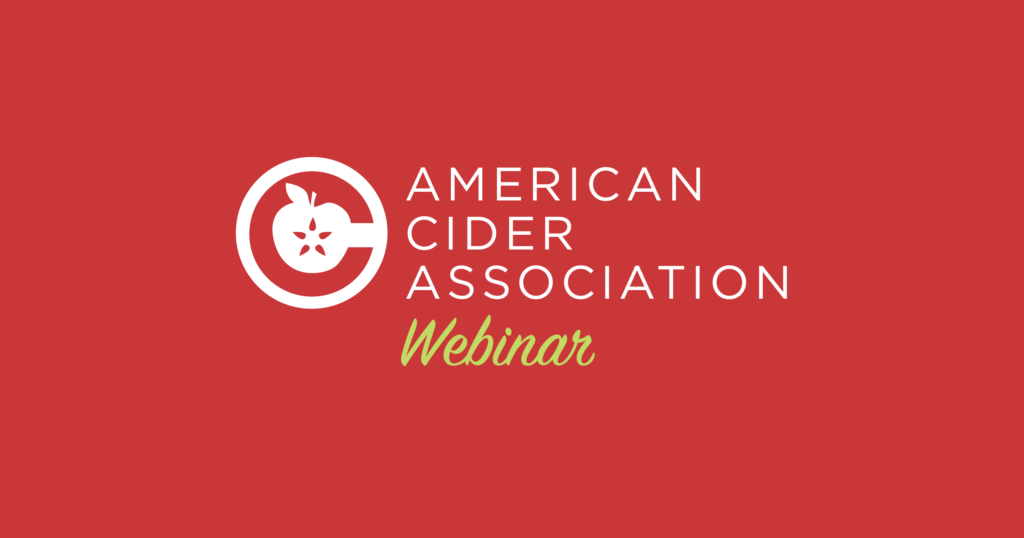
CiderCon Encore: Driving Organizational Change
February 11, 2021 – 9:30 am Pacific Time
Likely, you checked the Math to make sure your facility move, new software system, or acquisition was going to make or save your business money. Organizational changes can look good on paper but fail to deliver on the promise of increased profits or savings if the people impacts aren’t considered and managed. For your initiative to work, you’ll likely need some combination of employees, customers and suppliers to stop doing something and start doing something else. In this presentation by Stephanie Hartman of Catalyst Consulting, you will get a blend of academic theory and practical tools for addressing the tactical and emotional aspects of organizational change.
The link to the Zoom meeting will be sent to all CiderCon attendees prior to the date of the course. Brought to you by CiderPros.com
CiderCon Encore: Avoiding Common Pitfalls of Business Maturity
February 18, 2021 – 9:30 am Pacific Time
Working with small business owners across many industries, Stephanie Hartman of Catalyst Consulting learned about their ambitions and the fears at the root of their missteps. Through these stories, she began to recognize common pitfalls at each phase of business maturity. For those who did not get help soon enough, the pitfalls either ended their business, or the business survived at the cost of the owner’s well-being or important relationships. Those who took necessary steps, restored balance in their lives and found new inspiration. Business thriving requires courage to look honestly at your contribution to the chaos and make tough decisions, about processes, people, and more. In this presentation, you will learn actionable tips to help you avoid the common pitfalls or escape them if you’re already there, giving you confidence about your next steps.
The link to the Zoom meeting will be sent to all CiderCon attendees prior to the date of the course. Brought to you by CiderPros.com
Cider Business School: A Crash Course in Running Your Cidery as a Business
February 24, 2021 – 11:00am Pacific Time
You started your cidery because you love making cider, but no one told you most of your days would be spent behind a computer or in meetings handling the less glamorous aspects of your business. You don’t need an MBA to run a successful cidery, but there are some business basics you need to master, including operations, sales, and accounting. In this webinar, Ekos will provide an overview of what you need to know in each area, advice for how technology can help you be more efficient, and tips for taking your business to the next level.
Register HERE!
New CiderCon Session: Fermenting with Quince
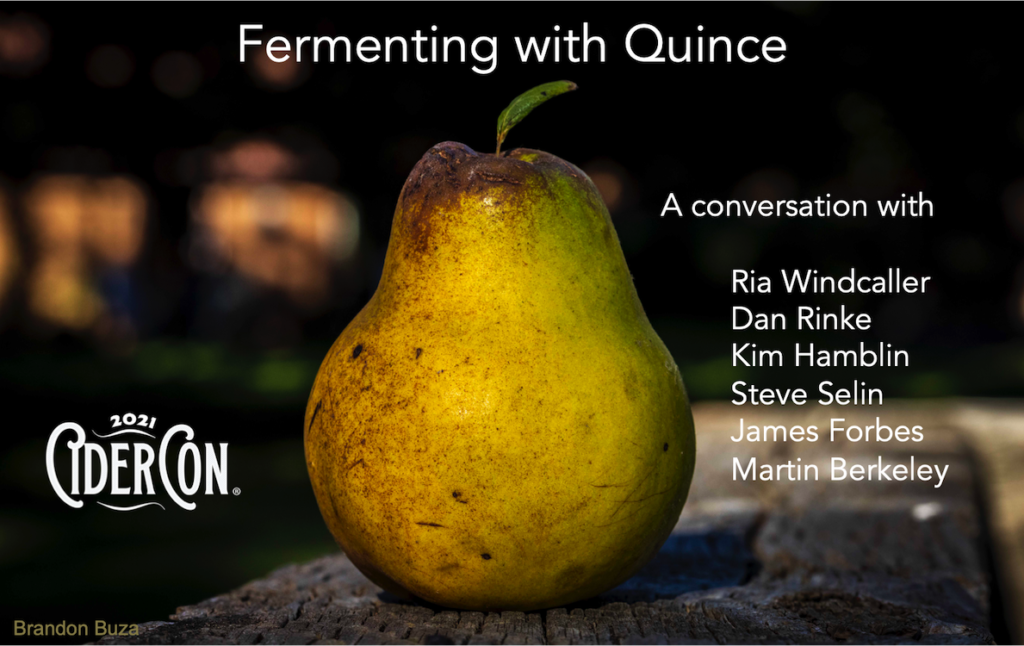
Was Aphrodite’s Forbidden Fruit a quince or the apple? She’s not talking, but cidermakers will be at CiderCon®!
Quince a.k.a. Cydonia oblonga is the sole member of the genus Cydonia in the family Rosaceae. Quince is a ‘pomme’ fruit with the likes of apples, pears, and medlars. This golden pomme is having a renaissance of sorts with makers partly due to it aromatic qualities and tannins.
Kim Hamblin and Dan Rinke of Art + Science in Oregon, Steve Selin of South Hill Cider in New York and UK makers Martin Berkley of Pilton Cider and James Forbes of Little Pomona will discuss fermenting with quince with moderator Ria Windcaller of Cider Chat.
Learn more about this and other CiderCon® sessions HERE!
BREAKING NEWS: TTB Approves Additional Wine Standards of Fill
In a special edition newsletter sent to subscribers on December 28, 2020, the TTB announced new rules regarding standards of fill. The additional volumes approved for wine are:
- 355 ml (12 oz)
- 250 ml
- 200 ml
As all ciders are regulated as wine by the TTB, the above sizes are now being added as approved for cider. This means ciders above 7% will be able to be packaged in a 12 oz can or bottle for the first time. Previously, a state exemption was required to package ciders over 7% ABV in 355 ml packaging.
“These new container sizes will provide bottlers with flexibility by allowing the use of the added container sizes, and will facilitate the movement of goods in domestic and international commerce, while also providing consumers broader purchasing options,” the TTB writes in their newsletter.
The TTB newsletter included a final draft of the rule. The rule includes several mentions of submitted commentary from cidermakers and the American Cider Association (ACA) (formerly United States Association of Cider Makers).
An excerpt: “These producers note that, in the production of cider, apples often naturally ferment to an alcohol by volume (abv) level just above 7.4%, so producers often take steps to lower the abv below 7% so that the standards of fill regulations will not apply, enabling them to use 355 milliliter containers. They state that sugar levels in apples vary widely depending on climate and other factors, making final alcohol levels difficult to predict. They argue that being able to use the 355 milliliter container size will eliminate this uncertainty.”
“The ACA government affairs committee worked to make this happen,” said Michelle McGrath, executive director of ACA. “Additionally, so many of our members came together to provide comments. Our united voices made the difference.”
“ACA believes that this will help apple-focused cidermakers and others with packaging flexibility and compliance,” McGrath added.
The addition of 200 ml containers is also a win for US ice cider producers. “This will help our ice cider business, where 200ml has been a traditional ice wine bottle size outside the US for decades, and we have not had access to that format,” said ice cider producer and ACA board member, Eleanor Leger.
“There are many styles of cider, and packaging flexibility will allow us to deliver the right cider to the customer in the right package. We are excited that we can finally put ciders produced with heirloom and tannic varieties in a more accessible format for customers,” Leger added.
The American Cider Association is grateful to the TTB for providing a platform for industry and public comment. “We are very pleased that the TTB continues to work with industry to evaluate regulation and its relevance to current market conditions,” ACA board President Paul Vander Heide said. “Broadening standards of fill gives our members increased flexibility to serve their customers.”
CiderCon® Session: Labeling of Hard Ciders Under FDA Jurisdiction
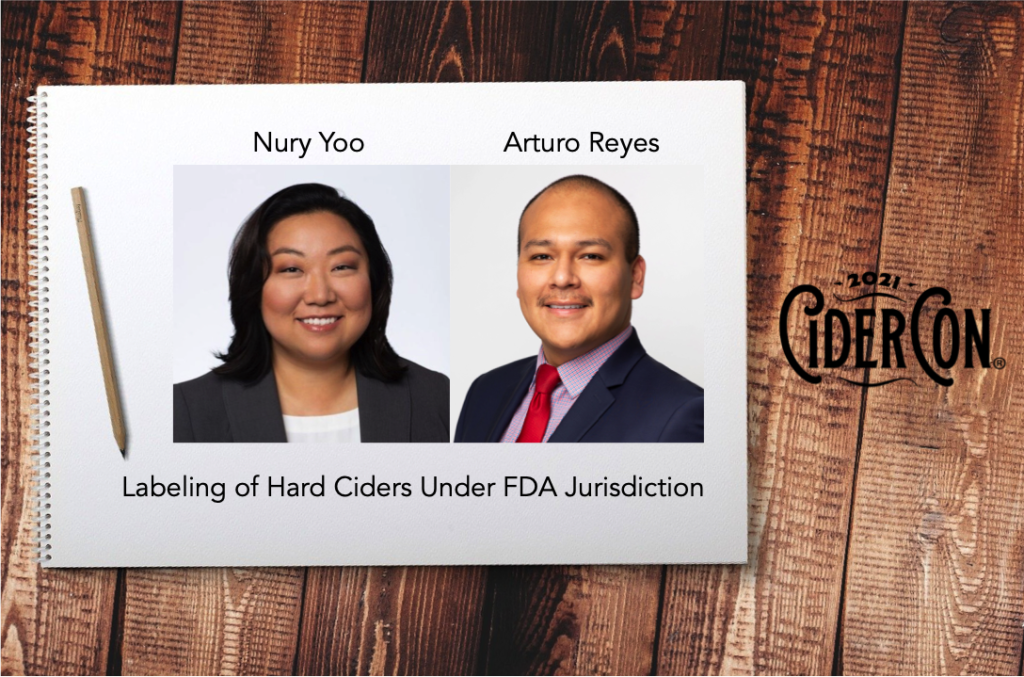
Is your hard cider under 7% ABV? If so, do your labels comply with U.S. Food and Drug Administration (FDA) labeling regulations? Join Keller and Heckman food and beverage attorneys Nury Yoo and Arturo Reyes as they discuss the ins and outs of FDA’s labeling requirements for these products. The discussion will also touch on other “labeling” aspects to consider, such as claims on packaging and in advertising/marketing/social media, as well as strategies to help manage the risk of potential consumer class action and competitor challenges.
We’re thrilled to have experienced lawyers, Nury Yoo and Arturo Reyes, of Keller and Heckman join us at CiderCon® to talk about the ins and outs of FDA compliance. Learn more about them below or on our Speaker page.
Nury Yoo
Nury Yoo represents clients in the food, beverage, cosmetics, dietary supplement, personal care, and alcohol beverage industries, as a member of Keller and Heckman’s Tier 1 nationally-ranked Food and Drug Practice. Her areas of expertise include regulatory compliance, labeling, marketing and advertising (including social media), food safety, product recalls, due diligence reviews in connection with private investment, California’s Proposition 65, and the complex federal and state issues surrounding the use of cannabidiol (CBD) and related cannabinoids in consumer products. She also advises clients on litigation risk analysis and avoidance measures, responses to litigation demand letters, and the development and implementation of litigation strategy.
Nury is actively involved with the Food and Drug Law Institute (FDLI) and is a frequent speaker on regulatory compliance and litigation risk issues related to the food industry.
Arturo Reyes
Arturo Reyes advises domestic and foreign clients on compliance with California’s Proposition 65, as well as food and food-contact material requirements, in a host of jurisdictions. He counsels clients on U.S. Food and Drug Administration (FDA) and U.S. Department of Agriculture (USDA) regulations relating to food, alcoholic and non-alcoholic beverages, cosmetics, and food contact materials.
Arturo assists clients by reviewing food labeling and promotional materials, including suitable common or usual names, ingredient declarations, nutrition labeling, health claims, nutrient content claims, and allergen labeling. He prepares labeling information for food products marketed in Australia, Canada, Mexico, Hong Kong, Taiwan, and the Philippines.
Prior to attending law school, Arturo worked as a litigation paralegal and, before that, as a fellow at the New York City Mayor’s Office, where he worked with numerous city officials, including the Food Policy Coordinator for the City of New York. Arturo is fluent in Spanish and Italian.
Cider Tax News
UPDATE: On 12/27/20 President Trump signed the bill making the reform included in the CBMTRA permanent.
On Monday night, Congress took the important step to pass permanent Federal excise tax credits for the nation’s cideries, meaderies, wineries, breweries, and distilleries. The tax reform measures for alcohol producers were originally introduced on a two-year basis in 2017 and renewed for one year late in 2019. The renewal was set to expire on December 31, 2020, but thanks to the inclusion of the Craft Beverage Modernization and Tax Reform Act (CBMTRA) in the most recent COVID relief bill, the excise tax credits are now permanent. The transition from temporary tax bill to permanence was relatively rapid thanks to enormous bipartisan popularity in both the Senate and House of Representatives as well as unprecedented collaboration of cider, wine, beer, spirits, and mead.
The bill removes prior barriers to growth by increasing the defining production threshold of a small cidery or winery and maintaining tiered tax credits as cideries grow and meet those thresholds.
“Many cideries feared exceeding the original small producer threshold. The permanent passage of the CBMTRA removes that fear,” said Michelle McGrath, executive director of the American Cider Association (ACA).
CBMTRA had many Congressional champions that ensured its success including the Senate co-sponsors Senate Finance Ranking Member Senator Wyden (D-OR) and Senator Roy Blunt (R-MO), House co-sponsors Representative Kind (D-WI) and Representative Kelly (R-PA), House Ways and Means Committee Chair Representative Neal (D-MA), House Ways and Means Ranking Member Kevin Brady (R-TX), Senate Majority Leader Mitch McConnell (R-KY), Senate Minority Leader Charles Schumer (D-NY), Senate Finance Chair Charles Grassley (R-IA), House Speaker Nancy Pelosi (D-CA), and House Minority Leader Kevin McCarthy (R-CA).
“America’s cidermakers can take a deep breath knowing that not only will their Federal excise taxes not go up on January 1, but the annual cycle of uncertainty regarding those taxes will stay behind with 2020,” said Brooke Glover, vice president of the American Cider Association.
“These tax credits were passed relatively recently, but many new cideries have never known any other way. I’m grateful they aren’t facing a tax increase come January 1. This can provide a bit of much needed confidence to do business in 2021,” said McGrath.
ACA played a supportive role in the craft beverage coalition that lobbied to make the credits permanent.
“Our members have worked hard to host members of Congress at their cideries, visit their offices in DC and participate in collaborative days of action. I was really proud of ACA’s membership,” McGrath said. “We are also extremely grateful to our colleagues in wine, beer, spirits and mead for including us in the beverage coalition.”
The American Cider Association encourages its members to make sure they are taking advantage of these tax credits and to let the ACA know how they are investing the savings. The Association will be rolling out educational resources to explain the nuances of how the CBMTRA benefits cider businesses in the coming weeks.
“Thank you to our members for renewing your membership year after year. Your small annual investment in the ACA has added up to much bigger permanent tax savings for you,” added McGrath. “Cider has a seat at the table. We have increasing numbers of Congressional champions. Our association is working.”
The bill now heads to President Trump for his signature and he is anticipated to sign. In a time when it is desperately needed, the CBMTRA supports jobs, farms and craft manufacturing.
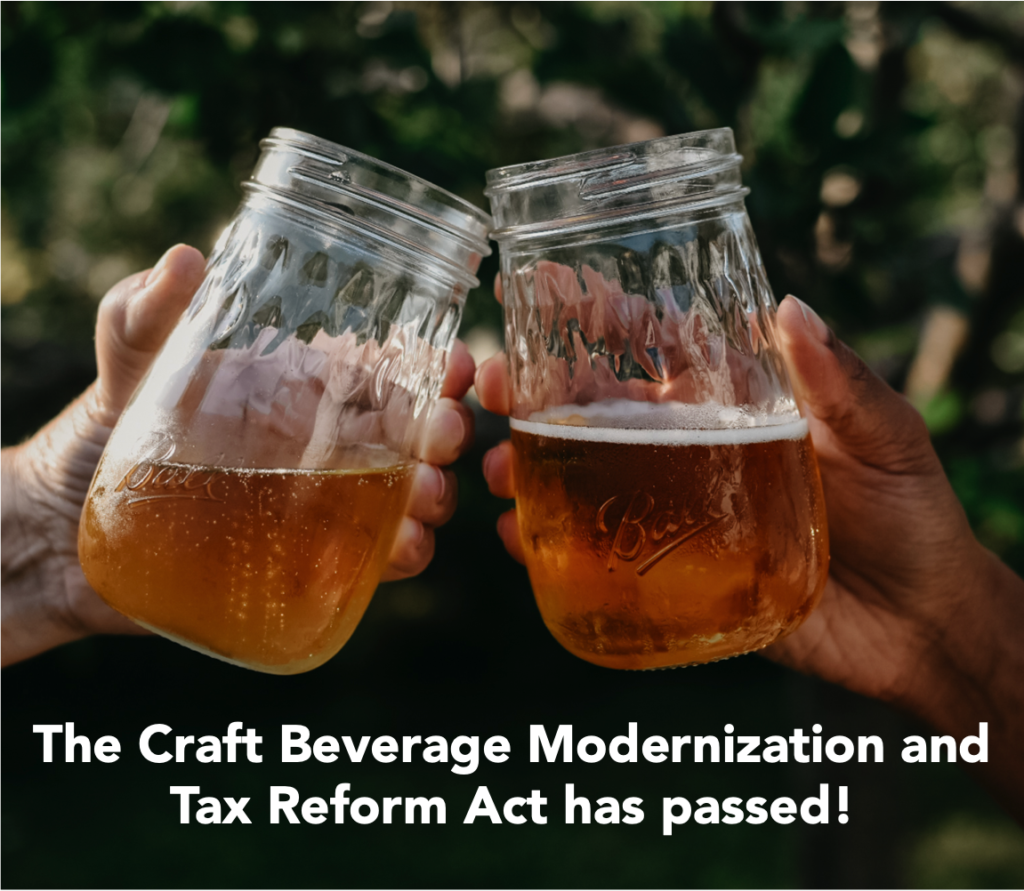
New CiderCon® Session: Strategies for Creating a Successful Blend
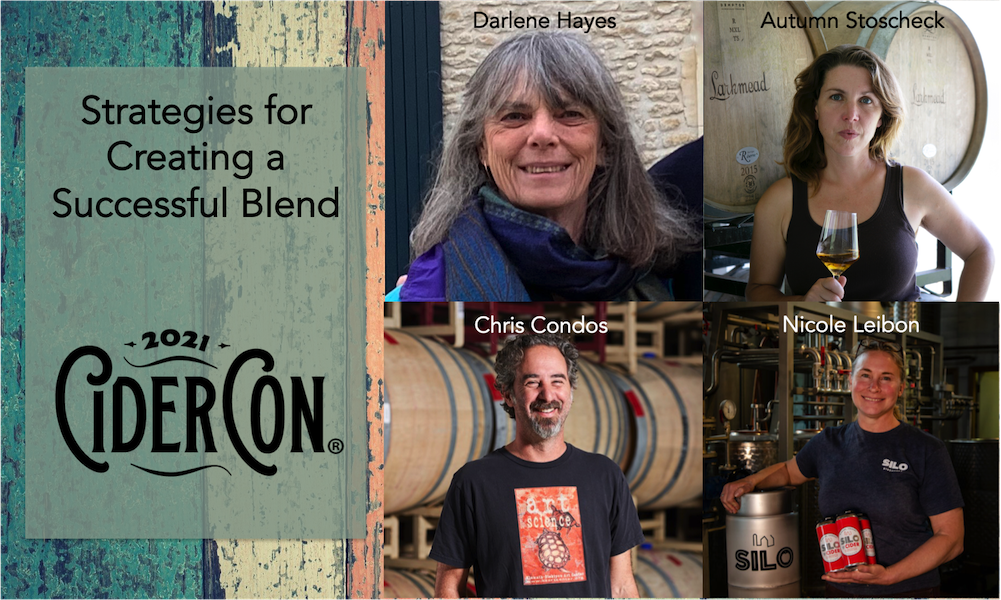
What does it take to make a successful blend? What’s the best way to do a blend? How can we use blending to create a cider with that perfect aroma and flavor profile?
A finished cider can be a combination of apple varieties that have been fermented separately, a blend of different vintages, or the amalgamation of a multiplicity of fermentation vessels combined to assure consistency in a release. Blending to create the perfect aroma and flavor profile in that cider is an essential skill, but one that takes time and effort to learn. Our panelists will share their many years of blending experience which will help you to jump start a new skill or give you tips that will take your blending game to a new level.
Join Darlene Hayes, Nicole Leibon, Autumn Stoscheck, and Chris Condos as they discuss these questions and more during their session at CiderCon® 2021.
This session is in the Cider Production Track sponsored by CINA.
Reflections on ACA’s Equity & Inclusion Training with Board Member Brooke Glover
I volunteer as Vice President of the Board of Directors of the American Cider Association (ACA) because I care deeply about the cider industry and appreciate that the Board is very involved and active in the ACA’s work and mission. As part of the ACA mission statement to create a diverse cider industry, and part of our commitment to antiracism we made back in June, the ACA recently hosted an equity and inclusion training for our Board of Directors on November 10th
Dr. J Jackson-Beckham, the principal at Crafted for All and a trusted advisor with the ACA, was tapped to lead the training on Building Foundations for Equity & Inclusion. During the training, Dr. J reminded us that we were in a safe space and that we needed to feel comfortable to ask questions and express ourselves freely without judgment. After a really funny icebreaker (what’s your superpower!?), she provided us with her definitions for Inclusion, Equity and Justice (you can find more on that through her Patreon account). Her reason for this was to ensure we had a shared language to use during the training. This became the basis for much of our conversation.
I left with a few takeaways from Dr. J’s training that I think will help guide the ACA toward continuing our important work in this space:
- Filling quotas is not the goal. Our goal is having a diverse industry and that is not attained by simply checking boxes nor will be attained overnight, as much as we want that to happen. To achieve our goal of a diverse industry we must have process and progress.
- Setting small goals over and over again will keep the organization (and our world) moving forward.
- We are beginning to set small goals to track mechanisms for progress and process by:
- Tracking the demographics of speakers at CiderCon
- Continuing to make it known that we want to be inclusive and that all are welcome
- Refining processes for board and committee member development
- Making tools available to members such as policy templates, signage, and job description example verbiage
- We need to continue to be supportive and understanding toward others. We are trying to grow an amazing and robust cider industry and we are all on the same team
- A diverse industry means encouraging all to be a part of the industry— including people who think differently from each other and come from different backgrounds
Lastly, Dr. J gave us some homework to do before we meet again in order to make sure we have action items that come out of the training. We had some amazing discussions over the course of our training and it helped me to think about progress, education, and setting small goals. The ACA and our members seem to be excited to continue to work toward these goals and our overall mission. I am very appreciative of the volunteer work of our Equity & Inclusion Committee and the support of our members. I look forward to growing together as we work toward our shared vision for the industry.
—Brooke Glover, Co-owner of Swilled Dog Cider and ACA Vice President
Bulk Company Discounts for CiderCon® 2021!

There has never been a better time to bring your whole team to CiderCon®!
The best thing about CiderCon® going virtual this year is that it means you can bring more of your team to the party! With lower registration fees, not to mention no airfare, hotel, and travel expenses to limit you, so many more of your team members can enjoy the knowledge, camaraderie, and fun that CiderCon® has to offer, all from the comfort of their home or office.
Not only that, but we are offering some awesome discounts when you register your crew together! Bulk discounts are available to team members working for the same company. Check out the discount table below and then contact Ellen for your discount code!
Still on the fence about how many people to bring? Check out why Mark Ray, owner of Stowe Cider, is bringing his whole team for CiderCon® 2021!
“Since first attending CiderCon in 2016 we haven’t missed one yet. The diverse educational sessions and networking opportunities offer something for every focus and each member of your team. I can safely say we wouldn’t be where we are today without those experiences and are beyond grateful for the community that this conference has created. We are so excited to include the entire team in CiderCon this year and have no doubt that although it will be different, it will be just as beneficial in building the knowledge of our team while raising the cider community up in a time of need.”
Mark Ray, Owner & Cidermaker, Stowe Cider

